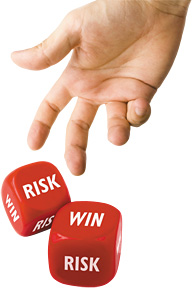7 Simple Ways to Reduce Your Cancer Risk
By Drs. Ronald Klatz and Robert Goldman
If the ever-present threat of cancer hasn't already influenced your health behaviors, consider these sobering statistics: As of late November 2009, the National Cancer Institute's
Surveillance Epidemiology and End Results (SEER) program estimated that 766,130 men and 713,220 women would be diagnosed with cancer in 2009 and that 562,340 Americans would die from the disease in 2009. Based on rates from 2004-2006, SEER also estimates that nearly one in two men and women born in 2009 will be diagnosed with cancer at some time during their lifetime. With those depressing odds in mind, there's no time like the present for you and your family to pursue natural ways to help ward off cancer. In short, you can't leave your health to a roll of the dice.
 1. Watch What You Weigh
1. Watch What You Weigh
According to the American Institute for Cancer Research (AICR), approximately 100,500 cancers that strike Americans annually are the result of excess body fat, underscoring the central role that overweight and obesity play in the development of cancer (and in the ability to survive the disease). According to the AICR, the estimated number of cancers linked to excess body fat include 49 percent of endometrial cancers (20,700 cases/year), 35 percent of esophageal cancers (5,800 cases/year), 28 percent of pancreatic cancers (11,900 cases/year), 24 percent of kidney cancers (13,900 cases/year), 21 percent of gallbladder cancers (2,000 cases/year), 17 percent of breast cancers (33,000 cases/year), and 9 percent of colorectal cancers (13,200 cases/year).
Laurence Kolonel, deputy director of the Cancer Research Center of Hawaii and an AICR expert panel member, in an article published on the AICR Web site in November 2009, emphasized this connection: "We now know that carrying excess body fat plays a central role in many of the most common cancers. And it's clearer than ever that obesity's impact is felt before, during and after cancer - it increases risk, makes treatment more difficult and shortens survival."
2. Think Natural (Not Chemical)
An October 2009 report by the American Cancer Society's Cancer and the Environment Subcommittee advises the public to minimize exposure to known carcinogens (cancer-causing substances), calling for new strategies to more effectively and efficiently screen chemicals. The subcommittee's initiative focuses on environmental hazards that have emerged as a result of the industrialization of the early 20th century, including naturally occurring substances that were first mined for industrial use, such as asbestos and uranium, to products extracted from natural sources, such as benzene from petroleum, to newly created substances such as vinyl chloride.
In CA: A Cancer Journal for Clinicians, Elizabeth T.H. Fontham, national volunteer president of the ACS and professor and dean at Louisiana State University Health Sciences Center, explains that while "exposure levels to environmental pollution to the general public are typically far lower than the levels associated with the proven cancer risks shown in occupational or other settings ... these low-level exposures do cause us concern because of the multiplicity of substances, the fact that many exposures are out of the public's control, and the potential that even low-level exposures contribute to the cancer burden when large numbers of people are exposed."

